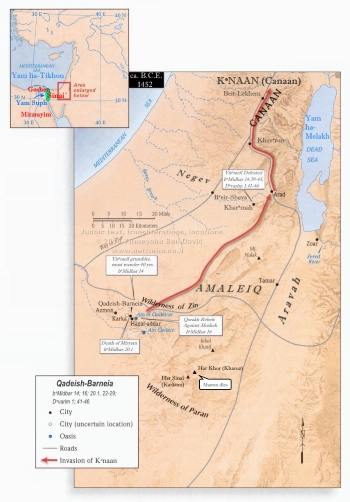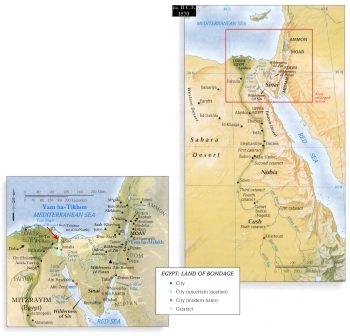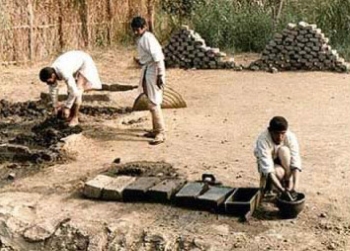
 |

 |
Mosh•ëhꞋ moved his family temporarily to Qâ•deishꞋ Bar•neiꞋa,![]() about a 1½ day journey (48km / ≈30mi) NW of Har Sin•aiꞋ. Even as he was getting his family settled and arranging pasturage for his tzon, Mosh•ëhꞋ sent a trusted ranch hand into Mi•tzᵊraꞋyim, as his ma•lâkhꞋ
about a 1½ day journey (48km / ≈30mi) NW of Har Sin•aiꞋ. Even as he was getting his family settled and arranging pasturage for his tzon, Mosh•ëhꞋ sent a trusted ranch hand into Mi•tzᵊraꞋyim, as his ma•lâkhꞋ![]() é‑‑ä emissary, to summon his brother, A•ha•ronꞋ, to come out to meet him at Har Sin•aiꞋ.
é‑‑ä emissary, to summon his brother, A•ha•ronꞋ, to come out to meet him at Har Sin•aiꞋ.
So the ma•lâkhꞋ![]() é‑‑ä caravanned the 14 days
é‑‑ä caravanned the 14 days![]() into Mi•tzᵊraꞋyim to meet A•ha•ronꞋ, announcing to him, "Go out bᵊ-mi•dᵊbarꞋ to meet Mosh•ëhꞋ."
into Mi•tzᵊraꞋyim to meet A•ha•ronꞋ, announcing to him, "Go out bᵊ-mi•dᵊbarꞋ to meet Mosh•ëhꞋ."
So A•ha•ronꞋ went out and met Mosh•ëhꞋ in Har ha-ël•oh•imꞋ, where he greeted Mosh•ëhꞋ with the customary Middle-Eastern kiss on each cheek.
Then Mosh•ëhꞋ related to A•ha•ronꞋ all of the words of the ma•lâkhꞋ![]() é‑‑ä, calling him, as well as all of the wondrous signs the ma•lâkhꞋ
é‑‑ä, calling him, as well as all of the wondrous signs the ma•lâkhꞋ![]() é‑‑ä had commanded him to perform for Par•ohꞋ.
é‑‑ä had commanded him to perform for Par•ohꞋ.
So Mosh•ëhꞋ and A•ha•ronꞋ assembled all of Zi•qᵊn•eiꞋ Bᵊn•eiꞋ-Yi•sᵊrâ•eilꞋ. And A•ha•ronꞋ repeated all of the matters that the ma•lâkhꞋ![]() é‑‑ä had related to Mosh•ëhꞋ, and he performed the signs in the sight of the am.
é‑‑ä had related to Mosh•ëhꞋ, and he performed the signs in the sight of the am.
So the am believed. And when they heard that é‑‑ä pâ•qâdꞋ Bᵊn•eiꞋ-Yi•sᵊrâ•eilꞋ, and He had seen their oppression, they nodded their heads and bowed.
 |
After rallying the am, Mosh•ëhꞋ and A•ha•ronꞋ went to the Egyptian capital, Thebes,![]() to negotiate with Par•ohꞋ Men-kheper
to negotiate with Par•ohꞋ Men-kheper Ra Tut-moses 3rd![]() , saying, "Thus says é‑‑ä, ël•oh•eiꞋ Yi•sᵊr•â•eilꞋ: Send forth My am so they may make a Khag to Me bᵊ-mi•dᵊbarꞋ!"
, saying, "Thus says é‑‑ä, ël•oh•eiꞋ Yi•sᵊr•â•eilꞋ: Send forth My am so they may make a Khag to Me bᵊ-mi•dᵊbarꞋ!"
"And who is this 'é‑‑ä'," Par•ohꞋ scolded derisively, "that I'm supposed to hearken to His Voice and send forth Yi•sᵊr•â•eilꞋ? I don't know any é‑‑ä! Mi•tzᵊraꞋyim has no such god! Accordingly, I will not send forth Yi•sᵊr•â•eilꞋ!"
Mosh•ëhꞋ and A•ha•ronꞋ attempted to explain. "We had an encounter with the ël•oh•imꞋ of the Ha•birꞋu. We're requesting to make a 3-day![]() Khag bᵊ-mi•dᵊbarꞋ where we will make a sacrifice to é‑‑ä, our ël•oh•imꞋ, lest He strike us with a deadly epidemic or sword."
Khag bᵊ-mi•dᵊbarꞋ where we will make a sacrifice to é‑‑ä, our ël•oh•imꞋ, lest He strike us with a deadly epidemic or sword."
"Why are the two of you, Mosh•ëhꞋ and A•ha•ronꞋ suddenly speaking for the Ha•birꞋu?" demanded the mëlꞋëkh Mi•tzᵊraꞋyim angrily. "Why do you interfere with the am and their business? Get back to work!!!:
"Look," the Par•ohꞋ continued sarcastically, pointing out a window, "how numerous is am hâ-ârꞋëtz – and you're advocating to impose their Sha•bâtꞋ![]() on every 7th day of their week?"
on every 7th day of their week?"![]()
 |
| mud-brickmaking |
Later that day, Par•ohꞋ Men-kheper Ra Tut-moses 3rd![]() issued the command to the Ha•birꞋu tax-collectors
issued the command to the Ha•birꞋu tax-collectors![]() and the quisling
and the quisling![]() police: "Obviously, since the Ha•birꞋu have time for a day off every seven days, they have too much time on their hands and have to sacrifice to their ël•oh•imꞋ to fill up their excessive idle time. So, you shall no longer provide straw to the am as in the past. Henceforth, they'll have to go out and scavenge straw for themselves. But the requirements of their mud-brick production shall not be reduced. Instead, let's fill up their idle time. Increase the requirements of their mud-brick production so that they can spend their time working instead of being distracted from work by lying words."
police: "Obviously, since the Ha•birꞋu have time for a day off every seven days, they have too much time on their hands and have to sacrifice to their ël•oh•imꞋ to fill up their excessive idle time. So, you shall no longer provide straw to the am as in the past. Henceforth, they'll have to go out and scavenge straw for themselves. But the requirements of their mud-brick production shall not be reduced. Instead, let's fill up their idle time. Increase the requirements of their mud-brick production so that they can spend their time working instead of being distracted from work by lying words."
Accordingly, the quisling![]() tax-collectors of hâ-âm went out with their police, announcing to hâ-âm: "Thus says Par•ohꞋ, 'I will not provide you with straw! Go out yourselves and scavenge your own straw where you find it. But your workload will not be reduced! ' "
tax-collectors of hâ-âm went out with their police, announcing to hâ-âm: "Thus says Par•ohꞋ, 'I will not provide you with straw! Go out yourselves and scavenge your own straw where you find it. But your workload will not be reduced! ' "
So hâ-âm dispersed throughout ërꞋëtz Mi•tzᵊraꞋyim scavenging the countryside for straw.
Meanwhile, the tax-collectors continually spurred and whipped the Ha•birꞋu corvées to work faster, saying, "Produce the same daily quota of mud-bricks as you did before you had to scavenge for straw!"
So the tax-collectors of Par•ohꞋ beat the quisling![]() Bᵊn•eiꞋ-Yi•sᵊrâ•eilꞋ police, whom the tax-collectors had set over them, demanding, "Why haven't you finished your allotted production of mud-bricks – both yesterday and today; just like before?"
Bᵊn•eiꞋ-Yi•sᵊrâ•eilꞋ police, whom the tax-collectors had set over them, demanding, "Why haven't you finished your allotted production of mud-bricks – both yesterday and today; just like before?"
Seeking redress after having been beaten, the Bᵊn•eiꞋ-Yi•sᵊrâ•eilꞋ police went to plead before Par•ohꞋ, asking, "Why did you do this to your workers? It's impossible to make mud-bricks without straw. We're not getting the straw to make mud-bricks anymore! But your tax-collectors persist in demanding the same daily production levels of mud-bricks. Now we, your workers, are being beaten by your am tax-collectors while it's them who are in error."
But Par•ohꞋ Men-kheper Ra Tut-moses 3rd![]() was ruthless. "You're lazy!!!" he shouted. "You say you have time to spend days going off on a Khag into the mi•dᵊbârꞋ to sacrifice to your é‑‑ä but you don't have time to keep up your production of mud-bricks. You're a bunch of lazy good-for-nothings! You get your lazy selves back to work and meet your production quotas of mud-bricks! No one is going to supply your straw anymore! Now get out and get back to work!!!"
was ruthless. "You're lazy!!!" he shouted. "You say you have time to spend days going off on a Khag into the mi•dᵊbârꞋ to sacrifice to your é‑‑ä but you don't have time to keep up your production of mud-bricks. You're a bunch of lazy good-for-nothings! You get your lazy selves back to work and meet your production quotas of mud-bricks! No one is going to supply your straw anymore! Now get out and get back to work!!!"
As the Bᵊn•eiꞋ-Yi•sᵊrâ•eilꞋ police were leaving the court they saw the tax collectors telling the bad news: "You shall not reduce a thing from your daily mud-brick production quotas!"
As they were coming home from their meeting with Par•ohꞋ, the Bᵊn•eiꞋ-Yi•sᵊrâ•eilꞋ police encountered Mosh•ëhꞋ and A•ha•ronꞋ, who were waiting for them.
"Let é‑‑ä see and judge you!" the Bᵊn•eiꞋ-Yi•sᵊrâ•eilꞋ police shouted angrily at Mosh•ëhꞋ and A•ha•ronꞋ. "Because you have turned our scent into a vile stench in the eyes of Par•ohꞋ and his workers. You've put the sword in their hand to carry out genocide on us!"
So Mosh•ëhꞋ returned to é‑‑ä![]() saying, " A•don•âiꞋ, why have you mistreated this am? You sent me for this??? Ever since I went to see Par•ohꞋ in Your Name he has mistreated this am. You have certainly not rescued Your am!!!"
saying, " A•don•âiꞋ, why have you mistreated this am? You sent me for this??? Ever since I went to see Par•ohꞋ in Your Name he has mistreated this am. You have certainly not rescued Your am!!!"
Then é‑‑ä replied to Mosh•ëhꞋ: "Now you'll see what I shall do to Par•ohꞋ. For a strong arm shall compel him to send them away; and a strong arm shall compel him to divorce them from his land."

Optional parental preparation:
The Bible tells us what happened with almost no errors. What the Bible makes no pretense of doing is to tell us all of the details or always explain how. It is left to us, in every age, to do our best to understand how to fill in the details in a sensible and realistic — not fairy tale, magical, mystical, mythical or supernatural — way to understand what happened.
The location of ancient Qâ•deishꞋ Bar•neiꞋa has been widely debated. While all indications point to Ein Qudeirat (30° 39.071'N, 34° 26.353'E) as the ancient archeological site, (especially Arab Christian and Muslim) archeologists, who would like to argue for an Arab / "Palestinian" site near Petra) point to cherry-picked, Iron Age dated sections of the Ein Qudeirat archeological excavation site to argue that this cannot be the Biblical site. It remains, however, that the oldest section of this site dates back to (Levant) Middle Bronze Age – which includes the Yᵊtzi•âhꞋ (see my Chronology Of The Tanakh, From The "Big ðÀèÄéÌÈä" Live-LinkT ![]() ).
). ![]()
3 days (& 3 nights), symbolizing the time spent in a tomb before it was opened for inspection to check if the person had (only been in a coma and) been resurrected into a second life. It would appear that the symbology employed by Mosh•ëhꞋ and A•ha•ronꞋ equated Egypt with the tomb and Am Yi•sᵊr•â•eilꞋ as a body to be resurrected after the 3 days & 3 nights caravan. Further, perhaps, Par•ohꞋ recognized that as well.
Moreover, from Goshen (the Nile Delta, in Lower [northern] Egypt), 3-days of an eastbound caravan equates to no more than 90km (≈56mi) – but that would take them across Yâm Suph and along the northern coast of the Sinai, beyond the Greek-Philistine outpost border colony of Pilas out of Egypt's recognized jurisdiction, to the mouth of Bardawil Lagoon and Isthmus. ![]()
What is a traditional Middle-Eastern greeting kiss? (Men gesture on each cheek. Distancing from appearances of marital infidelity, traditional Middle-Eastern men don't greet women who aren't relatives)
Questions you might anticipate that your child might raise and be prepared to discuss:
What does "impose" mean?
What does "onerous" mean?
What is a workload? A quota?
What is a ranch hand?
What is an emissary?
What does "scold" mean?
What does "derisive" mean?
What is an epidemic? A plague?
What is sarcasm?
What does "scavenge" mean?
What does the verb "spur" mean?
What does "alotted" mean?
What is legal redress?
What does "persist" mean?
What does "ruthless" mean?
What does "lazy" mean?
What do "scent," "vile" and "stench" mean?
What does "genocide" mean?
What does "mistreat" mean?
What does "compel" mean?
What is the literal meaning of the Hebrew verb "divorce"? (to drive away, drive off)
![]()
 |
 |